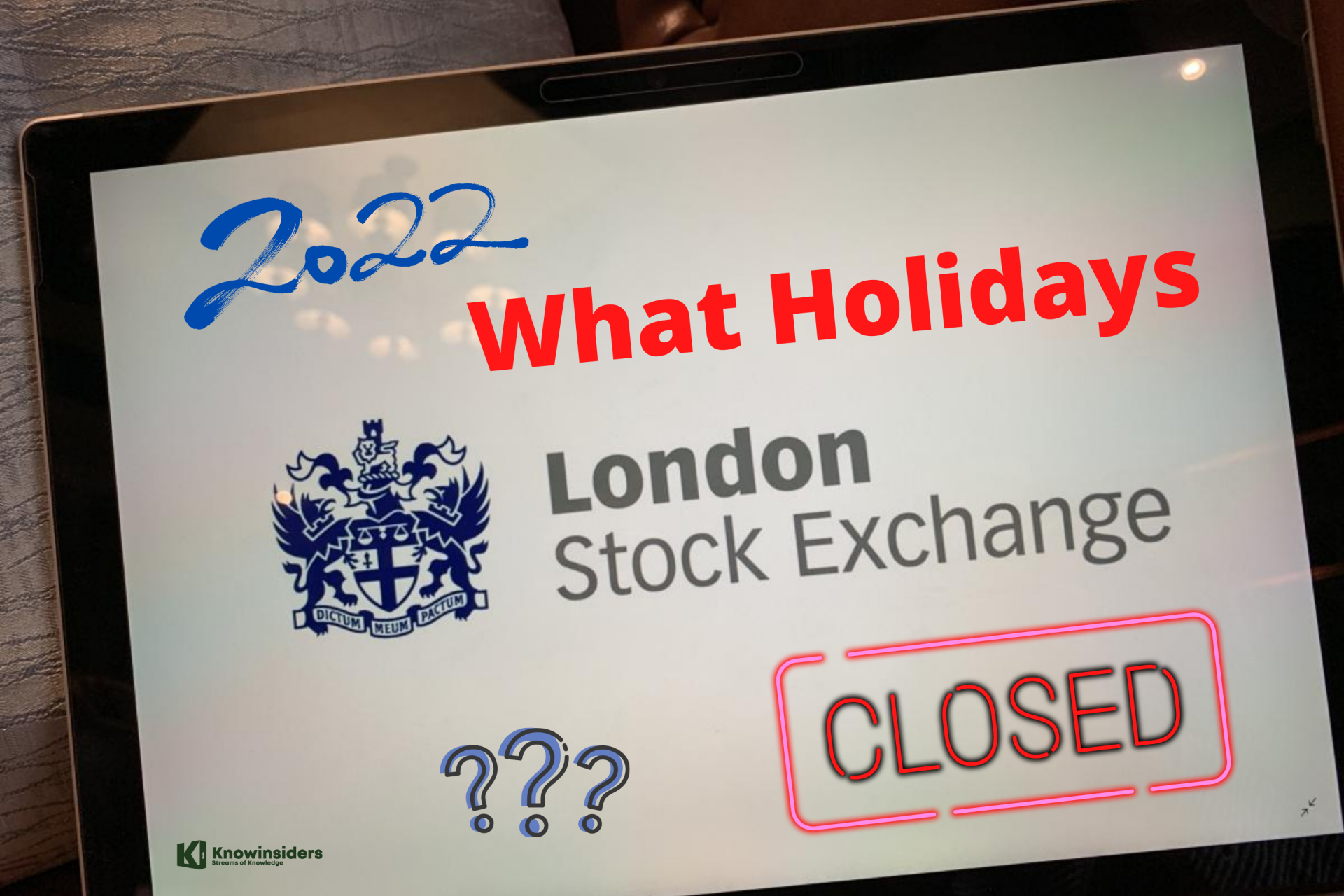Full List of Indian Stock Market Holidays: Are Indian Market Closed or Opened Today?
 |
| Holidays that Indian Stock Market is closed. Photo: KnowInsiders |
| Table of Contents |
If you are interested in working at Indian National Stock Exchange then you might know that the market remains closed on weekends i.e. Saturdays and Sundays. It has only five working days in a week i.e. Monday to Friday. Apart from weekends, the market will not work on the work on the following days.
What are the BSE and NSE?
Most of the trading in the Indian stock market takes place on its two stock exchanges: the Bombay Stock Exchange (BSE) and the National Stock Exchange (NSE). The BSE has been in existence since 1875. The NSE, on the other hand, was founded in 1992 and started trading in 1994. However, both exchanges follow the same trading mechanism, trading hours, and settlement process.
As of February 2020, the BSE had 5,518 listed firms, whereas the rival NSE had about 1,799 as of Dec. 31, 2019. Out of all the listed firms on the BSE, only about 500 firms constitute more than 90% of its market capitalization; the rest of the crowd consists of highly illiquid shares.
Almost all the significant firms of India are listed on both the exchanges. The BSE is the older stock market but the NSE is the largest stock market, in terms of volume. As such, the NSE is a more liquid market. In terms of market cap, they're both comparable at about $2.3 trillion. Both exchanges compete for the order flow that leads to reduced costs, market efficiency, and innovation. The presence of arbitrageurs keeps the prices on the two stock exchanges within a very tight range.
Full List of Indian Stock Market Holidays in 2024
Here's the complete list of stock market holidays in 2024:
In the first 14 days of the new year 2024, both the National Stock Exchange (NSE) and the Bombay Stock Exchange (BSE) will be closed. The BSE and NSE's holiday schedule indicates that there won't be any trading in the capital market, futures, or options segments.
The exchanges said the holiday dates may be changed for which a separate circular will be issued in advance.
1) January 26, 2024: Friday, Republic Day
2) March 8, 2024: Friday, Mahashivratri
3) March 25, 2024: Monday, Holi
4) March 29, 2024 Friday, Good Friday
5) April 11, 2024: Thursday, Id-Ul-Fitr (Ramzan Id)
6) April 17, 2024: Wednesday, Shri Ram Navmi
7) May 1, 2024: Wednesday, Maharashtra Day
8) June 17, 2024: Monday, Bakri Id
9) July 17, 2024: Wednesday, Moharram
10) August 15, 2024: Thursday, Independence Day
11) October 2, 2024: Wednesday, Mahatma Gandhi Jayanti
12) November 1, 2024: Friday, Diwali Laxmi Pujan
13) November 15, 2024: Friday, Gurunanak Jayanti
14) December 25, 2024: Wednesday, Christmas
*Muhurat Trading will be conducted on Friday, November 01, 2024. Timings of Muhurat Trading shall be notified subsequently.
Holidays That Fall On Saturday And Sunday
In addition to the list above, five holidays are observed on weekends and are not trading days.
April 14, Sunday: Dr.Baba Saheb Ambedkar Jayanti
April 21, Sunday: Mahavir Jayanti
September 07, Saturday: Ganesh Chaturthi
October 13, Sunday: Dussehra
November 02, Saturday: Diwali-Balipratipada
Please take note that the NSE is closed on Saturdays and Sundays, including the days of these festivals, for which a separate circular will be sent out beforehand.
When is the Diwali Muhurat trading?
The stock market holds a unique one-hour trading session known as the "Muhurat trading" session annually on Deepawali. "Muhurat" refers to a fortunate moment. The Muhurat trading is scheduled for November 1st this year. The exchange will make the times known prior to the meeting.
Timing of Share Market in India
 |
| Photo: Business Today |
For trading in the Indian stock market, you need to be aware of the stock market timing. Trading in the stock market can only be taken place during a specific time interval in India.
As per the normal stock market timing, the market opens at 09:15 AM and closes at 03:30 PM. There is a pre-open session before 09:15 AM and a post-closing session after 03:30 PM. Here are the details of share market timing in India.
| Timing | Particulars |
| From 09:00 AM to 09:08 AM | During these 8 minutes, the order of any transaction can be placed and the order placed can be modified. |
| From 09:08 AM to 09:12 AM | The timing is responsible for the price determination of security and in this 4 minute time you can not place/modify the order. This section is necessary so that price matching (Comparing demand and supply) can be performed. |
| From 09:12 AM to 09:15 AM | This is like a connection between pre-open and real open market timing. Here you can not place/modify the order. |
| From 09:15 AM to 03:30 PM | This is the normal session of the Indian Stock Market Timing. At this time you can freely place orders, modify the order, etc. There is no limitation of the stock market. |
| From 03:30 PM to 03:40 PM | In these 10 minutes, the closing price of the securities is calculated by taking the weighted average of the stock market traded between 03:00 PM to 03:30 PM. |
| From 03:40 PM to 04:00 PM | In these 20 minutes sessions, you can still place buy or sale orders but the orders are confirmed only if there are sufficient numbers of buyers and sellers in the market. |
What Time Does the Indian Stock Market Open & Close?
What is the difference between Trading Holidays and Clearing Holidays?
You should note that Trading Holidays and Clearing Holidays are completely different terms. We have explained both. You may take a look.
* Trading Holiday: On these days, the market does not open and trading does not take place.
* Clearing Holidays: These are the days when banks are closed but the market is open. All trading is done but there is no settlement on these days.
| Who Can Invest in India? India started permitting outside investments only in the 1990s. Foreign investments are classified into two categories: foreign direct investment (FDI) and foreign portfolio investment (FPI). All investments in which an investor takes part in the day-to-day management and operations of the company are treated as FDI, whereas investments in shares without any control over management and operations are treated as FPI. For making portfolio investments in India, one should be registered either as a foreign institutional investor (FII) or as one of the sub-accounts of one of the registered FIIs. Both registrations are granted by the market regulator, SEBI. Foreign institutional investors mainly consist of mutual funds, pension funds, endowments, sovereign wealth funds, insurance companies, banks, and asset management companies. At present, India does not allow foreign individuals to invest directly in its stock market. However, high-net-worth individuals (those with a net worth of at least $50 million) can be registered as sub-accounts of an FII. Foreign institutional investors and their sub-accounts can invest directly into any of the stocks listed on any of the stock exchanges. Most portfolio investments consist of investment in securities in the primary and secondary markets, including shares, debentures, and warrants of companies listed or to be listed on a recognized stock exchange in India. FIIs can also invest in unlisted securities outside stock exchanges, subject to the approval of the price by the Reserve Bank of India. Finally, they can invest in units of mutual funds and derivatives traded on any stock exchange. An FII registered as a debt-only FII can invest 100% of its investment into debt instruments. Other FIIs must invest a minimum of 70% of their investments in equity. The balance of 30% can be invested in debt. FIIs must use special non-resident rupee bank accounts in order to move money in and out of India. The balances held in such an account can be fully repatriated. How to Evaluate a Stock Before Investing?You can evaluate stocks through: Technical analysis: This involves a minute examination of the market for intraday trading. Here you have to analyze a slew of factors like movement average, Regarding Strength Index (RSI), etc. You can use the trends, patterns, analysis, and reports provided by stockbroking companies to analyze the stock movements. Fundamental analysis: Here, you can yourself study some key factors, like Returns on Equity, Earnings Yield, GP Margin, Debt to Equity Ratio, Interest Cover Ratio, Market Capitalisation, etc. This will provide you with greater clarity regarding stock prices. |
In conclusion
The compilation of stock market holidays will assist traders and investors engaged in securities trading. This holiday list will assist individuals in scheduling their stock market trading activities, particularly on the NSE and BSE, as trading is not permitted on days when the stock markets are closed.
FAQs
Is Saturday a holiday for the stock market?
Yes, stock markets in India have holidays on Saturdays.
Are Saturday and Sunday holidays for the stock market?
Yes, both Saturday and Sunday are holidays for the stock market in India.
Is Monday a holiday for the stock market?
No, stock markets are working on Mondays in India.
Is the Holi holiday for the stock market?
Yes, Holi is a holiday for the stock market.
Does the stock market remain closed on government holidays?
Yes, stock markets remain closed on government holidays.
How many total stock market holidays are there in 2024?
There are a total of 14 stock market holidays in 2024.
Which months have the most stock market holidays in 2024?
Stock markets in India have the most holidays in March 2024. There are 3 holidays in March 2024.
Where can I find a complete list of stock market holidays for 2024?
The complete list of stock market holidays in India for 2024, including NSE and BSE holidays, is given in the table in the section above.
Are there any regional stock market holidays in India?
Yes. In India, stock markets have holidays for festivals celebrated across most of the regions/states.
 What Holidays is the UK Stock Market Closed in 2022? What Holidays is the UK Stock Market Closed in 2022? The stock market closes on some UK holidays. Check out the full list of market holidays for LSE in 2022! |
 What Holidays is Canada Stock Market Closed in 2022? What Holidays is Canada Stock Market Closed in 2022? Canada Stock Market is closed on some official holidays in 2022. Check out the full list of holidays. |
 Top 10 Best Online Stock Brokers for Non-US Residents Top 10 Best Online Stock Brokers for Non-US Residents If you are looking to invest in the US stock market, below is a list of the 10 best online brokers for non-US residents. |


























